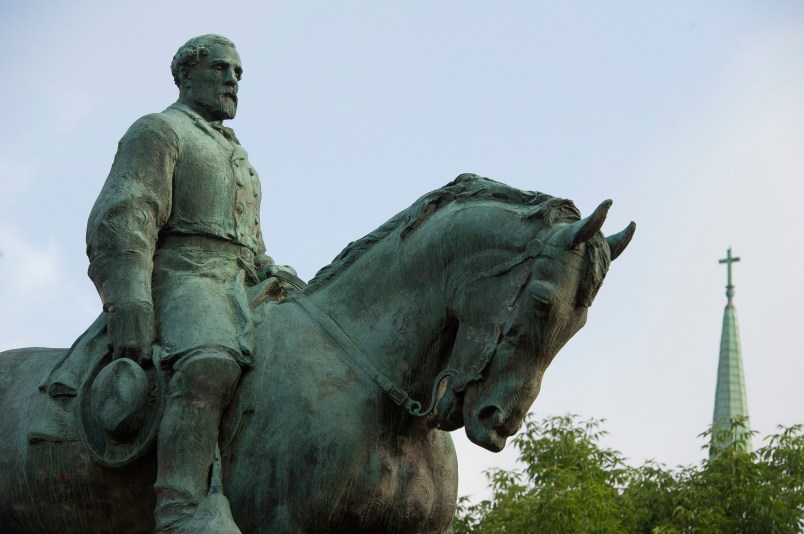Honestly, I think we should stop naming things after people. You never know what may come out in the future to cause some kind of controversy or what direction the winds of culture will start blowing. I'm not saying their is anything bad in Lewis's past, just saying you never know.
Politics: General Removal of Statues Thread
- Thread starter Ldlane
- Start date
- Status
- Not open for further replies.
I wish someone would remove that hideous statue of Coach Saban.
Yes. Especially since he refuses to take a public stance in the Alabama Senate race.I wish someone would remove that hideous statue of Coach Saban.

Virginia Military Institute removes Confederate statue
The Virginia Military Institute has removed a prominent statue of Confederate Gen. Thomas “Stonewall” Jackson. Around 9:45 a.m.
I haven't looked at the statute, but, apparently, in Alabama, a municipality or county can request a waiver to move a statue older than 40 years and the state has a review committee. Huntsville and Madison County requested such a waiver. If there's no response, then the waiver is granted automatically. It apparently got overlooked, so, after the 90 days expired, the governments moved the Confederate soldier monument from the courthouse to Maple Hill Cemetery, the section where Confederate and Union soldiers are buried. The Attorney General is suing the two under the act for the $25K fine provided for in the act, but he'll lose...
Virginia Military Institute removes Confederate statue
The Virginia Military Institute has removed a prominent statue of Confederate Gen. Thomas “Stonewall” Jackson. Around 9:45 a.m.apnews.com

House Passes Defense Bill Overwhelmingly, Defying Trump’s Veto Threat (Published 2020)
The $741 billion measure passed with a veto-proof majority, setting up a potential showdown with President Trump in the final weeks of his term.
WASHINGTON — The House overwhelmingly passed a $741 billion defense policy bill on Tuesday that would require that Confederate names be stripped from American military bases, defying President Trump’s veto threat and moving lawmakers one step closer to a potential showdown in his final weeks in office.
The 335-78 bipartisan vote to approve the legislation that authorizes pay raises for American troops reflected optimism among lawmakers in both parties that Congress would be able to force the enactment of the bill over Mr. Trump’s objections, in what would be the first veto override of his presidency. The margin surpassed the two-thirds majority both the House and Senate would need to muster to do so.
It also amounted to a remarkable break from the president by Republicans, who refused to defer to Mr. Trump’s desire to derail the critical bill as his time in the White House comes to a close.
good riddance
 www.governor.virginia.gov
www.governor.virginia.gov
Former Virginia Governor Ralph Northam - December
Governor Ralph Northam, 73rd Governor of Virginia
 www.governor.virginia.gov
www.governor.virginia.gov
Virginia Removes Confederate Statue from U.S. Capitol
Commission recently selected civil rights icon Barbara Johns to represent the Commonwealth with new statue
Events over the last year have seen the removal of statues of Robert E. Lee, and why they were erected in the first place has been ignored and mischaracterized. Here is how he reacted to political and military defeat.
Lee most likely did not vote for Abraham Lincoln (Lee was Whig and probably voted for Bell and Everett), but Lee continued to serve in the U.S. Army after Lincoln was elected. Lee continued to serve after Lincoln was inaugurated. In this, he showed how to react to his preferred candidate losing an election. He was so well thought of that the Lincoln administration offered him command of the Union army. Republican Francis Blair, at Lincoln’s request, offered command of the Union armies. In response, Lee said, “Mr. Blair, I look upon secession as anarchy. If I owned the four millions of slaves in the South I would sacrifice them all to the Union but how can I draw my sword upon Virginia, my native State?' (R. E. Lee by Douglas Southall Freeman, vol. 1, p. 635.)
Only after Lincoln called for troops to invade the states and overthrow the elected state governments (and Virginia withdrew from the Union in response action), did Lee resign.
Lee did not support secession. The morning after secession ordinance was passed by the Virginia Convention, Lee said, “I must say that I am one of those dull creatures that cannot see the good of secession.” (R. E. Lee by Douglas Southall Freeman, vol. 1, p. 439.)
Yet, when the Virginia Convention voted to leave the Union, Lee’s side (opponents of secession) lost, but went with the majority of his native state anyway.
In 1865, when further conventional military resistance was futile, Lee declined to disband the Army of Northern Virginia and fight on as guerillas. Instead, he surrendered to Grant, and agreed to desist from fighting. To a professor at Washington College who bad-mouthed Ulysses Grant, Lee said, ”Sir, if you ever presume again to speak disrespectfully of General Grant in my presence, either you or I will sever his connection with this university.” (Gamaliel Bradford, Lee the American, p. 226) After the war, Lee said, “Remember, we are all one country now. Dismiss from your mind all sectional feeling, and bring them up to be Americans.” In August, 1865, Lee wrote, “I think it the duty of every citizen, in the present condition of the country, to do all in his power to aid in the restoration of peace and harmony, and in no way to oppose the policy of the State or General (i.e. Federal) Government directed to that object. It is particularly incumbent on those charged with the instruction of the young to set them an example of submission to authority.” (Douglas Southall Freeman, R. E. Lee, vol. 4, p. 228.)
We have redefined Lee’s legacy and recharacterized why monuments were erected to him, but on Lee’s birthday, I wonder if Trump and his supporters might have benefited from his example.
Lee most likely did not vote for Abraham Lincoln (Lee was Whig and probably voted for Bell and Everett), but Lee continued to serve in the U.S. Army after Lincoln was elected. Lee continued to serve after Lincoln was inaugurated. In this, he showed how to react to his preferred candidate losing an election. He was so well thought of that the Lincoln administration offered him command of the Union army. Republican Francis Blair, at Lincoln’s request, offered command of the Union armies. In response, Lee said, “Mr. Blair, I look upon secession as anarchy. If I owned the four millions of slaves in the South I would sacrifice them all to the Union but how can I draw my sword upon Virginia, my native State?' (R. E. Lee by Douglas Southall Freeman, vol. 1, p. 635.)
Only after Lincoln called for troops to invade the states and overthrow the elected state governments (and Virginia withdrew from the Union in response action), did Lee resign.
Lee did not support secession. The morning after secession ordinance was passed by the Virginia Convention, Lee said, “I must say that I am one of those dull creatures that cannot see the good of secession.” (R. E. Lee by Douglas Southall Freeman, vol. 1, p. 439.)
Yet, when the Virginia Convention voted to leave the Union, Lee’s side (opponents of secession) lost, but went with the majority of his native state anyway.
In 1865, when further conventional military resistance was futile, Lee declined to disband the Army of Northern Virginia and fight on as guerillas. Instead, he surrendered to Grant, and agreed to desist from fighting. To a professor at Washington College who bad-mouthed Ulysses Grant, Lee said, ”Sir, if you ever presume again to speak disrespectfully of General Grant in my presence, either you or I will sever his connection with this university.” (Gamaliel Bradford, Lee the American, p. 226) After the war, Lee said, “Remember, we are all one country now. Dismiss from your mind all sectional feeling, and bring them up to be Americans.” In August, 1865, Lee wrote, “I think it the duty of every citizen, in the present condition of the country, to do all in his power to aid in the restoration of peace and harmony, and in no way to oppose the policy of the State or General (i.e. Federal) Government directed to that object. It is particularly incumbent on those charged with the instruction of the young to set them an example of submission to authority.” (Douglas Southall Freeman, R. E. Lee, vol. 4, p. 228.)
We have redefined Lee’s legacy and recharacterized why monuments were erected to him, but on Lee’s birthday, I wonder if Trump and his supporters might have benefited from his example.
I've studied the life of Robert E. Lee quite a bit...he was a first class man of his times, albeit flawed like all of us. His worst mistake was supporting Va. rather than taking the lead of the US Army. HIs second was Gettysburg and Pickett's Charge. Other than his expertise as a general, his finest day was surrendering with dignity and class to US Grant. The way he ended the war probably saved thousands of lives. His life post-war was exemplary.
I still do not understand why we cannot see that all of us are flawed in one way or another. To take a person out of their place and time and judge them by today's standards is just plain wrong...bad history and bad ethics.
Thanks to Tidewater for this timely reminder...
I still do not understand why we cannot see that all of us are flawed in one way or another. To take a person out of their place and time and judge them by today's standards is just plain wrong...bad history and bad ethics.
Thanks to Tidewater for this timely reminder...
I can't get past this The Atlantic article.

 www.theatlantic.com
www.theatlantic.com

The Myth of the Kindly General Lee
The legend of the Confederate leader’s heroism and decency is based in the fiction of a person who never existed.
sadly, the lost cause will not die. it reared its ugly head again this past few yearsI can't get past this The Atlantic article.

The Myth of the Kindly General Lee
The legend of the Confederate leader’s heroism and decency is based in the fiction of a person who never existed.www.theatlantic.com
Unfortunately, he ultimately made the WRONG choice, to take up arms against the US, which is why statues to him must be removed. He became a traitor.Events over the last year have seen the removal of statues of Robert E. Lee, and why they were erected in the first place has been ignored and mischaracterized. Here is how he reacted to political and military defeat.
Lee most likely did not vote for Abraham Lincoln (Lee was Whig and probably voted for Bell and Everett), but Lee continued to serve in the U.S. Army after Lincoln was elected. Lee continued to serve after Lincoln was inaugurated. In this, he showed how to react to his preferred candidate losing an election. He was so well thought of that the Lincoln administration offered him command of the Union army. Republican Francis Blair, at Lincoln’s request, offered command of the Union armies. In response, Lee said, “Mr. Blair, I look upon secession as anarchy. If I owned the four millions of slaves in the South I would sacrifice them all to the Union but how can I draw my sword upon Virginia, my native State?' (R. E. Lee by Douglas Southall Freeman, vol. 1, p. 635.)
Only after Lincoln called for troops to invade the states and overthrow the elected state governments (and Virginia withdrew from the Union in response action), did Lee resign.
Lee did not support secession. The morning after secession ordinance was passed by the Virginia Convention, Lee said, “I must say that I am one of those dull creatures that cannot see the good of secession.” (R. E. Lee by Douglas Southall Freeman, vol. 1, p. 439.)
Yet, when the Virginia Convention voted to leave the Union, Lee’s side (opponents of secession) lost, but went with the majority of his native state anyway.
In 1865, when further conventional military resistance was futile, Lee declined to disband the Army of Northern Virginia and fight on as guerillas. Instead, he surrendered to Grant, and agreed to desist from fighting. To a professor at Washington College who bad-mouthed Ulysses Grant, Lee said, ”Sir, if you ever presume again to speak disrespectfully of General Grant in my presence, either you or I will sever his connection with this university.” (Gamaliel Bradford, Lee the American, p. 226) After the war, Lee said, “Remember, we are all one country now. Dismiss from your mind all sectional feeling, and bring them up to be Americans.” In August, 1865, Lee wrote, “I think it the duty of every citizen, in the present condition of the country, to do all in his power to aid in the restoration of peace and harmony, and in no way to oppose the policy of the State or General (i.e. Federal) Government directed to that object. It is particularly incumbent on those charged with the instruction of the young to set them an example of submission to authority.” (Douglas Southall Freeman, R. E. Lee, vol. 4, p. 228.)
We have redefined Lee’s legacy and recharacterized why monuments were erected to him, but on Lee’s birthday, I wonder if Trump and his supporters might have benefited from his example.

Confederate monument, erected in Gwinnett in 1993, comes down
At 10:01 p.m. Thursday night, the 28-year-old Confederate monument that stood in Lawrenceville’s downtown square lay in the back of a flatbed truck.
slowly, but shirley, we are making progress on the widespread participation trophy problem in this country


VA Supreme Court Rules Charlottesville Can Remove Confederate Statues
Virginia’s Supreme Court on Thursday cleared the path for authorities to remove...
talkingpointsmemo.com
but, but, the Commonwealth!slowly, but shirley, we are making progress on the widespread participation trophy problem in this country

VA Supreme Court Rules Charlottesville Can Remove Confederate Statues
Virginia’s Supreme Court on Thursday cleared the path for authorities to remove...talkingpointsmemo.com
Removal of Forrest remains begins with confrontation and threatsA work crew hired by the Sons of Confederate Veterans began Tuesday, June 1, setting the stage for the reinterment of Confederate general, slave trader and Ku Klux Klan Grand Wizard Nathan Bedford Forrest.
Crews in Health Sciences Park began Tuesday morning chipping away at the pedestal that until December 2017 was topped by an equestrian statue of Forrest.
And as they did so, the crew posted Confederate flags along the site and dumped buckets of rubble on the park’s Black Lives Matter sidewalk mural around the monument.
Forrest from a speech before the Pole Bearers (an African-American fraternal organization) in Memphis in 1875.
Ladies and Gentlemen I accept the flowers as a memento of reconciliation between the white and colored races of the southern States. I accept it more particularly as it comes from a colored lady, for if there is any one on God's earth who loves the ladies I believe it is myself. [Immense applause and laughter] This day is a day that is proud to me, having occupied the position that I did for the past twelve years, and been misunderstood by your race. This is the first opportunity I have had during that time to say that I am your friend. I am here a representative of the southern people, one more slandered and maligned than any man in the nation. I will say to you and to the colored race that the men who bore arms and followed the flag of the Confederacy are, with very few exceptions, your friends. I have an opportunity of saying what I have always felt that I am your friend, for my interests are your interests, and your interests are my interests. We were born on the same soil, breathe the same air, and live in the same land. Why, then, can we not live as brothers? I will say that when the war broke out I felt it my duty to stand by my people. When the time came I did the best I could, and I don't believe I flickered. I came here with the jeers of some white people, who think that I am doing wrong. I believe that I can exert some influence, and do much to assist the people in strengthening fraternal relations, and shall do all in my power to bring about peace. It has always been my motto to elevate every man to depress none. [Applause.] I want to elevate you to take positions in law offices, in stores, on farms, and wherever you are capable of going. I have not said anything about politics to-day. I don't propose to say anything about politics. You have a right to elect whom you please; vote for the man you think best, and I think, when that is done, that you and I are freemen. Do as you consider right and honest in electing men for office. I did not come here to make you a long speech, although invited to do so by you. I am not much of a speaker, and my business prevented me from preparing myself. I came to meet you as friends, and welcome you to the white people. I want you to come nearer to us. When I can serve you I will do so. We have but one flag, one country; let us stand together. We may differ in color, but not in sentiment. Use your best judgment in selecting men for office and vote as you think right. Many things have been said about me which are wrong, and which white and black persons here, who stood by me through the war, can contradict. I have been in the heat of battle when colored men, asked me to protect them. I have placed myself between them and the bullets of my men, and told them they should be kept unharmed. Go to work, be industrious, live honestly and act truly, and when you are oppressed I'll come to your relief. I thank you, ladies and gentle men, for this opportunity you have afforded me to be with you, and to assure you that I am with you in heart and in hand. [Prolonged applause.]
Memphis Daily Appeal, July 6, 1875, p. 1
I think Forrest is a very interesting person.
Ladies and Gentlemen I accept the flowers as a memento of reconciliation between the white and colored races of the southern States. I accept it more particularly as it comes from a colored lady, for if there is any one on God's earth who loves the ladies I believe it is myself. [Immense applause and laughter] This day is a day that is proud to me, having occupied the position that I did for the past twelve years, and been misunderstood by your race. This is the first opportunity I have had during that time to say that I am your friend. I am here a representative of the southern people, one more slandered and maligned than any man in the nation. I will say to you and to the colored race that the men who bore arms and followed the flag of the Confederacy are, with very few exceptions, your friends. I have an opportunity of saying what I have always felt that I am your friend, for my interests are your interests, and your interests are my interests. We were born on the same soil, breathe the same air, and live in the same land. Why, then, can we not live as brothers? I will say that when the war broke out I felt it my duty to stand by my people. When the time came I did the best I could, and I don't believe I flickered. I came here with the jeers of some white people, who think that I am doing wrong. I believe that I can exert some influence, and do much to assist the people in strengthening fraternal relations, and shall do all in my power to bring about peace. It has always been my motto to elevate every man to depress none. [Applause.] I want to elevate you to take positions in law offices, in stores, on farms, and wherever you are capable of going. I have not said anything about politics to-day. I don't propose to say anything about politics. You have a right to elect whom you please; vote for the man you think best, and I think, when that is done, that you and I are freemen. Do as you consider right and honest in electing men for office. I did not come here to make you a long speech, although invited to do so by you. I am not much of a speaker, and my business prevented me from preparing myself. I came to meet you as friends, and welcome you to the white people. I want you to come nearer to us. When I can serve you I will do so. We have but one flag, one country; let us stand together. We may differ in color, but not in sentiment. Use your best judgment in selecting men for office and vote as you think right. Many things have been said about me which are wrong, and which white and black persons here, who stood by me through the war, can contradict. I have been in the heat of battle when colored men, asked me to protect them. I have placed myself between them and the bullets of my men, and told them they should be kept unharmed. Go to work, be industrious, live honestly and act truly, and when you are oppressed I'll come to your relief. I thank you, ladies and gentle men, for this opportunity you have afforded me to be with you, and to assure you that I am with you in heart and in hand. [Prolonged applause.]
Memphis Daily Appeal, July 6, 1875, p. 1
I think Forrest is a very interesting person.
That was a great dodge, to sell the parks to a non-profit, which could in turn resell it. I wonder why HSV didn't try that. Here, the statute says that the state has to approve the removal of monuments within a period of time, I think 25 days, and the city and county waited them out, since they were sure it'd been forgotten. Then they moved the statute while the state screamed and threatened suit. The city here pulled something similar wrt to the state statute against municipally-owned broadband, entering into a partnership, where the partnership actually owns the fiber...
- Status
- Not open for further replies.
TideFans.shop - 25% off Fan Favorites!
TideFans.shop - 25% off!
Get this and many more items at our TideFans.shop!
Purchases may result in a commission being paid to TideFans.Latest threads
-
-
-
-
-
Yahoo: Alabama football updates 2025 roster. Here's what you need to know
- Started by TideFans Reporter
- Replies: 0
-
ESPN: Big 12 preview: Colorado's reload, Arizona State's repeat bid, and the return of Utah and K-State
- Started by TideFans Reporter
- Replies: 0






